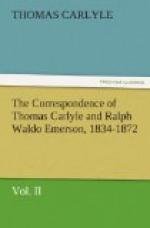Since I last wrote to you, I found it needful, if only for the household’s sake, to set some new lectures in order, and go to new congregations of men. I live so much alone, shrinking almost cowardly from the contact of worldly and public men, that I need more than others to quit home sometimes, and roll with the river of travelers, and live in hotels. I went to Baltimore, where I had an invitation, and read two lectures on New England. On my return, I stopped at Philadelphia, and, my Course being now grown to four lectures, read them there. At New York, my snowball was larger, and I read five lectures on New England. 1. Religion; 2. Trade; 3. Genius, Manners and Customs; 4. Recent literary and spiritual influences from abroad; 5. Domestic spiritual history.—Perhaps I have not quite done with them yet, but may make them the block of a new and somewhat larger structure for Boston, next winter. The newspaper reports of them in New York were such offensive misstatements, that I could not send you, as I wished, a sketch. Between my two speeches at Baltimore, I went to Washington, thirty-seven miles, and spent four days. The two poles of an enormous political battery, galvanic coil on coil, self-increased by series on series of plates from Mexico to Canada, and from the sea westward to the Rocky Mountains, here meet and play, and make the air electric and violent. Yet one feels how little, more than how much, man is represented there. I think, in the higher societies of the Universe, it will turn out that the angels are molecules, as the devils were always Titans, since the dulness of the world needs such mountainous demonstration, and the virtue is so modest and concentrating.
But I must not delay to acknowledge the arrival of your Book. It came ten or eleven days ago, in the “Britannia,” with the three letters of different dates announcing it.—I have read the superfluous hundred pages of manuscript, and find it only too popular. Beside its abundance of brilliant points and proverbs, there is a deep, steady tide taking in, either by hope or by fear, all the great classes of society,—and the philosophic minority also, by the powerful lights which are shed on the phenomenon. It is true contemporary history, which other books are not, and you have fairly set solid London city aloft, afloat in bright mirage in the air. I quarrel only with the popular assumption, which is perhaps a condition of the Humor itself, that the state of society is a new state, and was not the same thing in the days of Rabelais and of Aristophanes, as of Carlyle. Orators always allow something to masses, out of love to their own art, whilst austere philosophy will only know the particles. This were of no importance, if the historian did not so come to mix himself in some manner with his erring and grieving nations, and so saddens the picture; for health is always private and original, and its essence is in its unmixableness.—But this Book, with all its affluence of wit, of insight, and of daring hints, is born for a longevity which I will not now compute.—In one respect, as I hinted above, it is only too good, so sure of success, I mean, that you are no longer secure of any respect to your property in our freebooting America.




